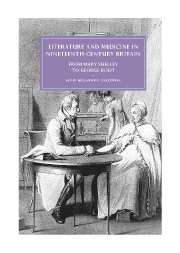Book contents
- Frontmatter
- Contents
- Acknowledgments
- 1 Introduction: Romantic materialism
- 2 Science and sympathy in Frankenstein
- 3 Natural supernaturalism in Thomas Carlyle and Richard Owen
- 4 Wuthering Heights and domestic medicine: the child's body and the book
- 5 Literalization in the novels of Charlotte Brontë
- 6 Charles Darwin and Romantic medicine
- 7 Middlemarch and the medical case report: the patient's narrative and the physical exam
- Notes
- Bibliography
- Index
- CAMBRIDGE STUDIES IN NINETEENTH-CENTURY LITERATURE AND CULTURE
4 - Wuthering Heights and domestic medicine: the child's body and the book
Published online by Cambridge University Press: 22 September 2009
- Frontmatter
- Contents
- Acknowledgments
- 1 Introduction: Romantic materialism
- 2 Science and sympathy in Frankenstein
- 3 Natural supernaturalism in Thomas Carlyle and Richard Owen
- 4 Wuthering Heights and domestic medicine: the child's body and the book
- 5 Literalization in the novels of Charlotte Brontë
- 6 Charles Darwin and Romantic medicine
- 7 Middlemarch and the medical case report: the patient's narrative and the physical exam
- Notes
- Bibliography
- Index
- CAMBRIDGE STUDIES IN NINETEENTH-CENTURY LITERATURE AND CULTURE
Summary
On first consideration, Emily Brontë may seem out of step with the medical thinking of the period. She was personally averse to any form of medical treatment, and during her final illness she rebuffed her sisters' attempts to send for a doctor. Charlotte, nearly desperate, wrote that Emily “has refused medicine, rejected medical advice; no reasoning, no entreaty, has availed to induce her to see a physician.” Although Emily never explained her aversion, we may see some clue to it in her portrayal of a country surgeon in Wuthering Heights. Kenneth is a morose, pessimistic visitor at the deathbed, who refuses hope to Frances and family, pronouncing, according to a servant girl, that “mississ must go … I heard him tell Mr. Hindley … she'll be dead before winter” (WH, 49). When Lockwood gets a cold, he complains of Kenneth's “terrible intimation” that “I need not expect to be out of doors till spring!” (WH, 70). Nelly tells us that doom-and-gloom Kenneth, called to Catherine in her grief after Heathcliff's departure, makes swift work of his attendance:
Mr. Kenneth, as soon as he saw her, pronounced her dangerously ill; she had a fever.
He bled her, and he told me to let her live on whey and water gruel; and take care she did not throw herself down stairs, or out of the window; and then he left, for he had enough to do in the parish where two or three miles was the ordinary distance between cottage and cottage.
(WH, 68)- Type
- Chapter
- Information
- Literature and Medicine in Nineteenth-Century BritainFrom Mary Shelley to George Eliot, pp. 68 - 96Publisher: Cambridge University PressPrint publication year: 2004



